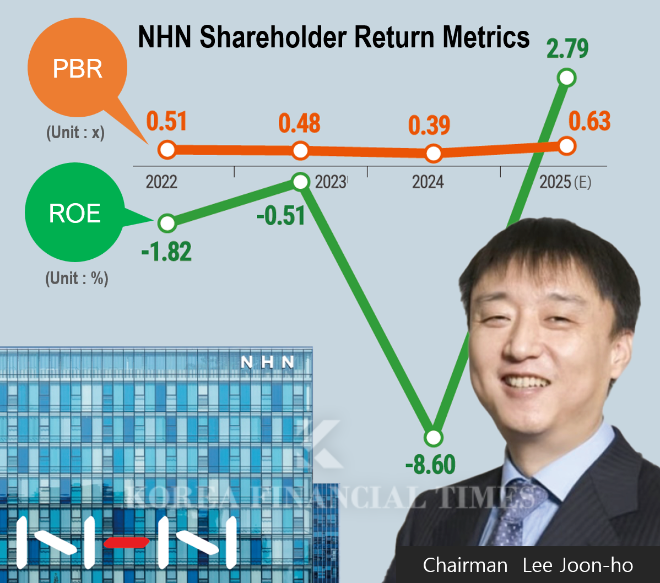NHN has expanded into various information technology sectors beyond its core gaming business, moving into music streaming, payment services, and cloud computing. The company’s share price remains in the high KRW 20,000 range, closing at KRW 27,800 on August 12. This marks a steep decline of around 81% from its KRW 149,500 valuation at the time of its 2013 spin-off from Naver.
PBR represents the ratio of a company's market value to its book value. A PBR below 1 suggests that the stock is undervalued relative to its assets, potentially making it attractive to investors.
NHN was created through the spin-off of Naver’s gaming division. Since then, Chairman Lee Joon-ho, who also serves as chairman of the board, has sought to transform NHN into a comprehensive IT firm—reducing its reliance on gaming while pursuing aggressive mergers and acquisitions to diversify.
CEO Chung U-jin, in his twelfth year at the helm, has faithfully carried forward Lee’s ambitions. The number of subsidiaries grew from 39 at his appointment to 89 in 2022. Notable subsidiaries formed during this period include NHN KCP (a digital payments company), NHN Payco, NHN Bugs, and NHN Cloud.
Nevertheless, performance has worsened since 2022. According to the company’s reports, consolidated operating profit came in at KRW 39.1 billion in 2022 and KRW 55.6 billion in 2023, turning to an operating loss of KRW 32.6 billion last year. Net losses amounted to KRW 31.8 billion in 2022, KRW 23.1 billion in 2023, and KRW 192.6 billion in 2024.
In 2022, Chung announced a structural efficiency strategy, aiming to reduce consolidated subsidiaries to around 60 by 2024, focusing on five core businesses: gaming, technology, payments, commerce, and content. As of March this year, NHN had scaled down to 69 subsidiaries.
During the Q1 2025 earnings call, Chung remarked, “We are accelerating structural improvements by concentrating resources on our core services.”
In 2022, NHN introduced a three-year shareholder return plan allocating 30% of EBITDA to shareholder rewards.
Accordingly, the company retired more than 3.75 million treasury shares — equivalent to 10% of its outstanding stock — between 2022 and last year. However, since NHN began paying regular dividends two years ago, the market has grown increasingly curious about the motives behind the move.
NHN initiated its first dividend of KRW500 per share in 2023, marking the tenth anniversary of its spin-off. The company maintained the same dividend amount last year (2024), despite posting net losses in both years—which resulted in a negative dividend payout ratio.
According to an industry insider, “Even with consecutive losses, NHN’s commitment to dividends over the past two years has been remarkably strong. Chairman Lee Joon-ho is expected to receive billions of won in dividend income annually.”
In reality, Chairman Lee Joon-ho’s direct stake in NHN has grown from 3.74% in 2013 to 28.76% as of 2025. Including JLC (9.92%) and JLC Partners (8.88%), both wholly owned by Lee, along with family affiliates holding 7.05%, Lee and related parties together control 54.61% of the company.
In April 2022, controversy flared over Chairman Lee Joon-ho’s growing influence during the physical spin-off of NHN Cloud. Minority shareholders fiercely objected, arguing that by carving out the company’s prized cloud business in this manner, only Lee’s control was strengthened while the interests of shareholders were disregarded.
The shareholders at the time argued, "If the IPO of the cloud division is pursued, it would intentionally undermine the value of the parent company," further claiming that "this is evidence that share price support is being avoided to facilitate succession."
Lee’s son, born in 1992, joined NHN in 2021 to head a new business task force but left in 2024 to study abroad. NHN has countered claims of succession planning, stating that it had established provisions for allocating shares of any newly-listed subsidiary to parent company shareholders and that no second-generation succession is currently under consideration.
Jeong Chaeyun (chaeyun@fntimes.com)
가장 핫한 경제 소식! 한국금융신문의 ‘추천뉴스’를 받아보세요~
데일리 금융경제뉴스 Copyright ⓒ 한국금융신문 & FNTIMES.com
저작권법에 의거 상업적 목적의 무단 전재, 복사, 배포 금지













!['From Heavy Industry to Humanoids' — Doosan Robotics Charts a New Future in Physical AI [K-Humanoid Wars, Part 3]](https://cfnimage.commutil.kr/phpwas/restmb_setimgmake.php?pp=006&w=284&h=214&m=5&simg=2026030310061306979141825007d12411124362.jpg&nmt=18)


!['Samsung's Bet on the Future' — Rainbow Robotics, Korea's Humanoid Pioneer [K-Humanoid Wars, Part 2]](https://cfnimage.commutil.kr/phpwas/restmb_setimgmake.php?pp=006&w=284&h=214&m=5&simg=2026022413501808272141825007d12411124362.jpg&nmt=18)
![Tesla's Humanoid Rival Has Arrived — Boston Dynamics Eyes $70 Billion Valuation [K-Humanoid Wars, Part 1]](https://cfnimage.commutil.kr/phpwas/restmb_setimgmake.php?pp=006&w=284&h=214&m=5&simg=2026022010243207659141825007d12411124362.jpg&nmt=18)

![Samsung's 'Last Chance': Lee Jae-yong Pushes HBM4 as Make-or-Break Moment [KFT Topic]](https://cfnimage.commutil.kr/phpwas/restmb_setimgmake.php?pp=006&w=284&h=214&m=5&simg=2026012623242806011141825007d122461258.jpg&nmt=18)
![Tesla's Humanoid Rival Has Arrived — Boston Dynamics Eyes $70 Billion Valuation [K-Humanoid Wars, Part 1]](https://cfnimage.commutil.kr/phpwas/restmb_setimgmake.php?pp=006&w=110&h=79&m=5&simg=2026022010243207659141825007d12411124362.jpg&nmt=18)

!['Samsung's Bet on the Future' — Rainbow Robotics, Korea's Humanoid Pioneer [K-Humanoid Wars, Part 2]](https://cfnimage.commutil.kr/phpwas/restmb_setimgmake.php?pp=006&w=110&h=79&m=5&simg=2026022413501808272141825007d12411124362.jpg&nmt=18)

